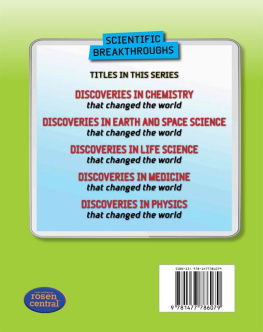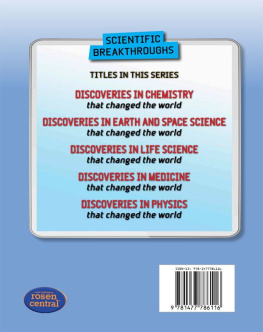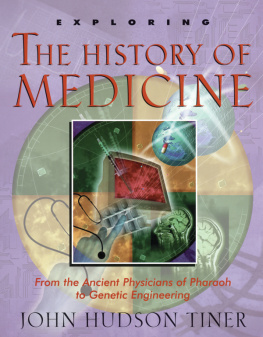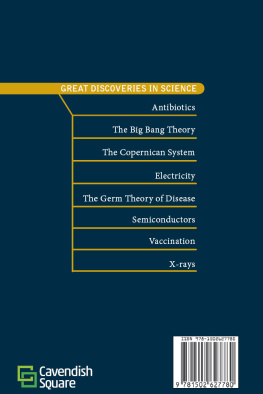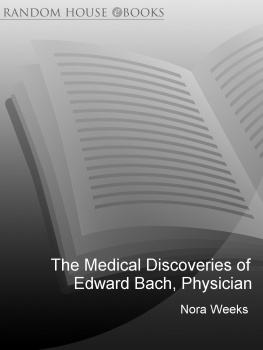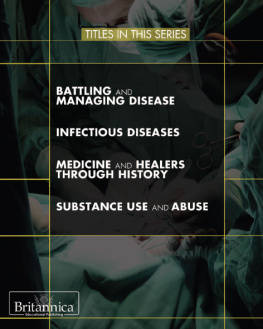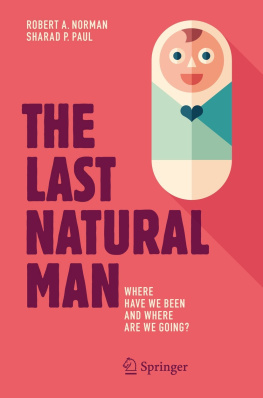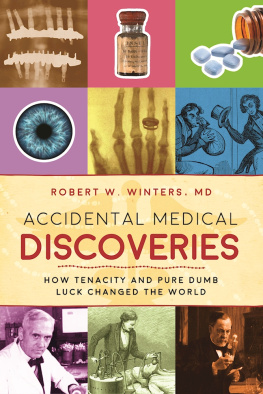Contents at a Glance
Breakthrough!
How the 10 Greatest Discoveries in Medicine Saved Millions and Changed Our View of the World
Jon Queijo
Vice President, Publisher: Tim Moore
Associate Publisher and Director of Marketing: Amy Neidlinger
Editorial Assistant: Pamela Boland
Acquisitions Editor: Kirk Jensen
Development Editor: Russ Hall
Operations Manager: Gina Kanouse
Senior Marketing Manager: Julie Phifer
Publicity Manager: Laura Czaja
Assistant Marketing Manager: Megan Colvin
Cover Designer: Stauber Design Studio
Managing Editor: Kristy Hart
Project Editor: Anne Goebel
Copy Editor: Language Logistics
Proofreader: Kathy Ruiz
Indexer: Erika Millen
Graphics: Laura Robbins
Senior Compositor: Gloria Schurick
Manufacturing Buyer: Dan Uhrig
2010 by Pearson Education, Inc.
Publishing as FT Press Science
Upper Saddle River, New Jersey 07458
FT Press Science offers excellent discounts on this book when ordered in quantity for bulk purchases or special sales. For more information, please contact U.S. Corporate and Government Sales, 1-800-382-3419, .
Company and product names mentioned herein are the trademarks or registered trademarks of their respective owners.
All rights reserved. No part of this book may be reproduced, in any form or by any means, without permission in writing from the publisher.
Printed in the United States of America
First Printing March 2010
ISBN-10: 0-13-713748-6
ISBN-13: 978-0-13-713748-0
Pearson Education LTD.
Pearson Education Australia PTY, Limited.
Pearson Education Singapore, Pte. Ltd.
Pearson Education North Asia, Ltd.
Pearson Education Canada, Ltd.
Pearson Educacin de Mexico, S.A. de C.V.
Pearson EducationJapan
Pearson Education Malaysia, Pte. Ltd.
Library of Congress Cataloging-in-Publication Data
Queijo, Jon, 1955
Breakthrough! : how the 10 greatest discoveries in medicine saved millions and changed our
view of the world / Jon Queijo.
p. cm.
Includes bibliographical references.
ISBN 978-0-13-713748-0 (hardback : alk. paper) 1. MedicineResearchHistory. 2.
Discoveries in science. I. Title.
R852.Q45 2010
610.72dc22
2009051043
With love and gratitude to my parents, Anthony A. Queijo and June Dudley Queijo.
And a very special thanks to Rooshey Hasnain, who helped me every step of the way with her many ideas and her boundless encouragement, support, and caring.
The most exciting phrase to hear in science, the one that heralds the most discoveries, is not Eureka! but Thats funny.
Isaac Asimov, American writer and biochemist
Thats funny...
Alexander Fleming, on finding a moldy growth that led to his discovery of penicillin
Acknowledgments
Thanks to all of the folks at Pearson/FT Press Science for their hard work and encouragement in bringing this book to fruition, especially Tim Moore, Russ Hall, Gina Kanouse, Anne Goebel, Julie Phifer, Megan Colvin, Kirk Jensen, Amanda Moran, Chrissy White, Laura Robbins, and Pam Boland. And finally, thanks to Jim Markham, for introducing me to the world of book writing.
About the Author
Jon Queijo has been writing about science and medicine for more than 25 years in positions that include senior medical writer in the pharmaceutical industry, staff writer for the New England Journal of Medicine consumer publication Weekly Briefings, and staff writer for Bostonia magazine. His freelance articles have appeared in various publications, including Brain Work (The Dana Foundation), Psychology and Personal Growth, Environment, and Science Digest. He has a Bachelor of Science degree in technical journalism from the University of Florida and a Master of Science degree in science communication from Boston University.
Introduction
Its tempting to start right off with an apology for the word breakthrough, a word thatdepending on your point of viewcan be as tedious as an overhyped headline or seductive as a brightly wrapped gift. Either way, its hard to resist wondering, What breakthrough? A cure for cancer, an easy way to lose weight, the secret to living forever? But this isnt that kind of book, and apologies seem unnecessary when youre talking about the ten greatest breakthroughs in all of medicine. Sadly, none involve easy weight loss or living forever. However, all are arguably more important because they meet three essential criteria: 1) They saved, improved, or reduced suffering in millions of lives; 2) They changed the practice of medicine; and 3) They transformed our understanding of the world. That last item is too often overlooked. All medical breakthroughs profoundly impact health and how physicians work; far rarer are those that open our eyes to a fundamentally new way of seeing the world, giving new meaning to not only such questions as, Why do we get sick, and how do we die? but also, How are we put together and what connects us to the rest of nature?
Each of these ten breakthroughs came at a time in history when they struck humanity like a thunderbolta jolt of awakening followed by a palpable rise in human consciousness. What? Illness is caused by natural forces and not evil spirits or angry gods? Inhaling certain gases can take away pain and not kill the patient? A machine can take pictures of the inside of your body? We often take it for granted today, but at one time, millions of people couldnt believe what they were hearing. They refused to believe it. Until they finally did. And then the world would never be the same.
Critics often have a field day with top ten lists. Motives are immediately suspect, every selection second-guessed, many better alternatives offered. But objectivity tends to crumble when one tries to measure how much any one discovery has impacted suffering, illness, and death. Nevertheless, one valid criticism is that top ten lists are overly simplistic. In our celebrity-obsessed times, the spotlights glare on a handful of superstars too often blinds us to the many individuals who helped pave the way. Yet what often makes a great discovery most fascinating is understanding the many smaller steps that often made the final leap possible. This book celebrates these steps and shows howmilestone by milestonethey led to ten final breakthrough discoveries.
Dont embark on these journeys expecting tales of calculating genius and easy success. In fact, the greatest breakthroughs in medicine represent a wildly unpredictable collage of human stories and emotion. Even if youre not surprised to learn how many discoveries relied on one individuals dogged persistence despite failure and repeated rejection, you may be shocked to learn how many discoveries resulted from sheer dumb luck, if not divine intervention. The number of coincidences that led to Alexander Flemings discovery of penicillin might tempt some atheists to reconsider their assumptions. Also surprising is how many individuals had no idea their work would one day lead to a major breakthrough. One example is Swiss physician Friedrich Miescher, who discovered DNA in 1869more than 70 years before scientists would figure out its role in heredity.
But though ignorance in the pursuit of truth is forgivable, its harder to sympathize with those throughout history who ridiculed a discovery because fear and rigid thinking prevented them from letting go of outdated beliefs and tradition. The examples are many: from the rejection of the pioneering work in germ theory by John Snow and Jacob Semmelweis in the early 1800s to the dismissal of Gregor Mendels laws of genetics in the 1860s whendespite ten years of hard workone eminent scientist snorted that Mendels work had really just begun. No doubt, many of the greatest discoveries in medicine were made by courageous individuals who dared shake the foundations of a long-held, and usually wrong, view of the world. And no surprise that, once the discovery was finally accepted and solid footing regained, the world found itself in a very different place.


